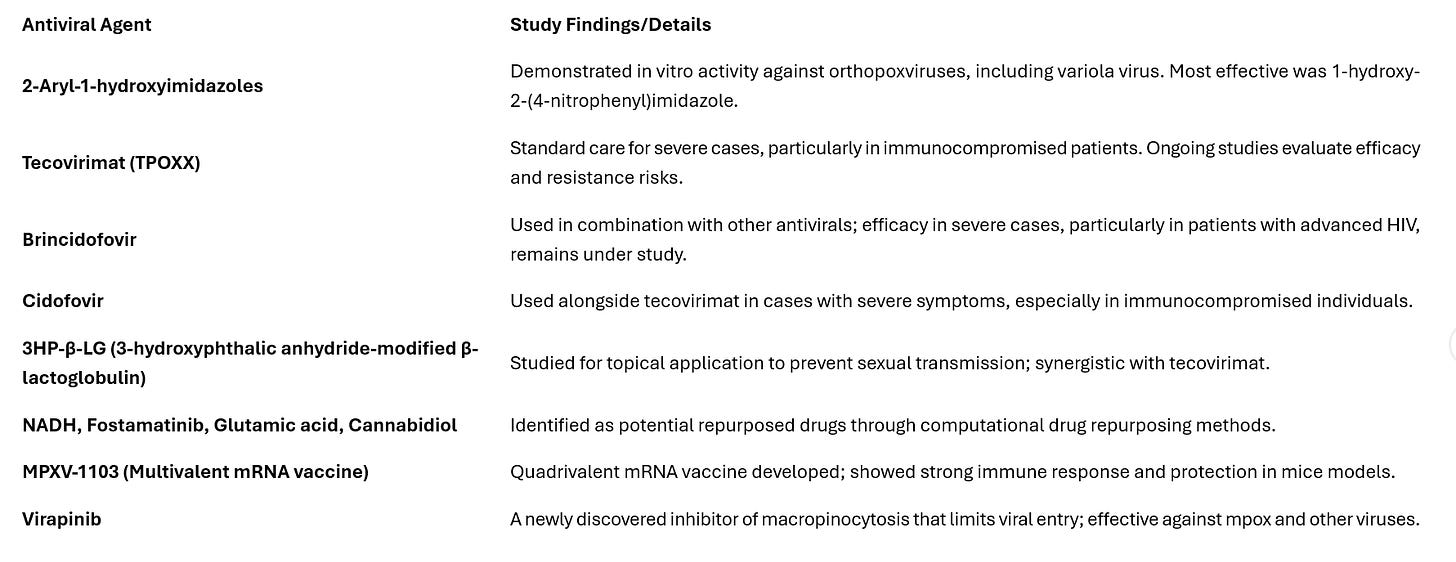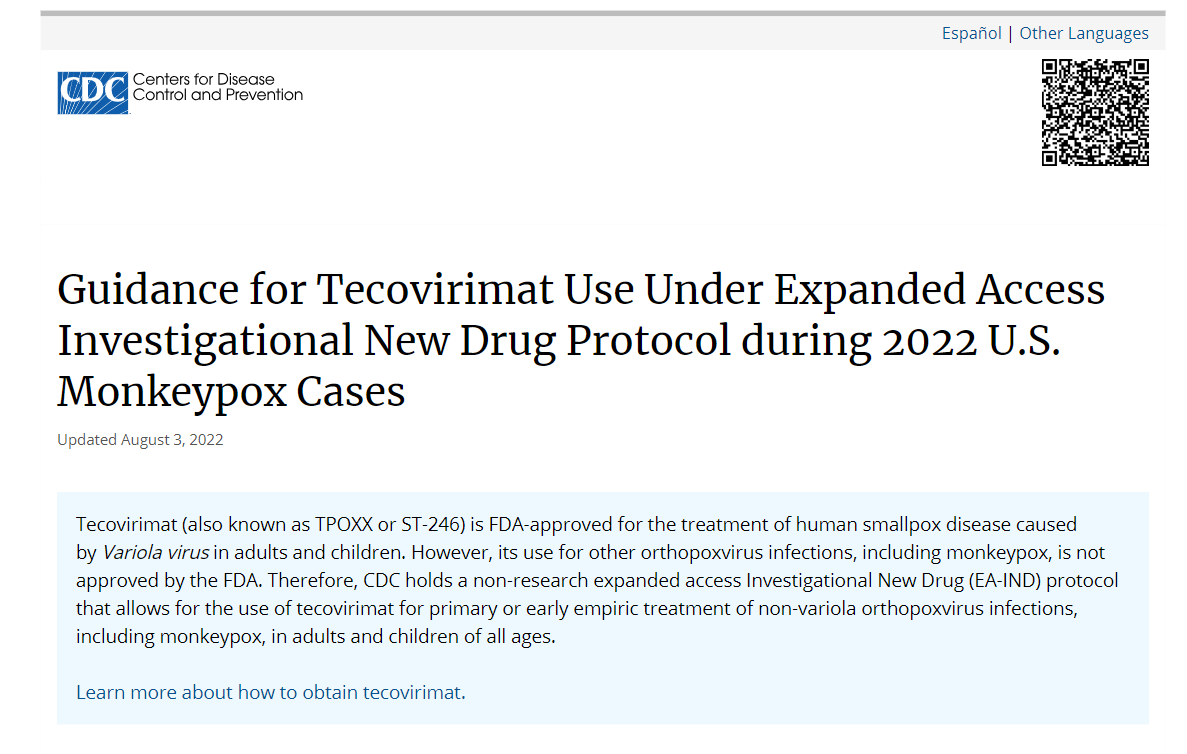CDC Has Monkeypox Antivirals Under Lockdown
The STOMP trial or CDC’s "expanded access protocols" are the only way to get treatments studied so far to patients. So far, one natural compound has been studied.
In an unusual move, the CDC is holding a monopoly on access to drugs that might be useful in treating a contagious virus. Here, we explore standard-of-care options for treating monkeypox.
Physicians in the field have found that care primarily focuses on alleviating symptoms and preventing complications, as no specific antiviral treatment has been approved specifically for monkeypox.
Potential (proposed) guidelines for managing the condition:
1. Symptomatic Treatment:
- Pain and Fever Management: Over-the-counter pain relievers such as ibuprofen or acetaminophen can help manage pain and fever.
- Hydration: Ensuring adequate fluid intake to prevent dehydration is crucial.
- Skin Care: Keep the skin lesions clean and dry. Calamine lotion or antihistamines might be used to alleviate itching.
2. Isolation and Prevention:
Isolation: Patients should be isolated to prevent the spread of the virus, especially when they are symptomatic and have active lesions.
- Hygiene: Regular handwashing and disinfecting surfaces can help reduce transmission.
3. Antiviral Treatments:
Tecovirimat (TPOXX) is an antiviral medication approved for the treatment of smallpox. Due to its activity against orthopoxviruses, it is sometimes used under compassionate use or in clinical trials for monkeypox.
Cidofovir and Brincidofovir are antiviral drugs sometimes used to treat severe orthopoxvirus infections. Their use for monkeypox is not well established, but it is generally considered when other options are unavailable.
4. Supportive Care:
- Monitoring for Complications: Patients should be monitored for potential complications, such as bacterial infections of skin lesions, pneumonia, or encephalitis, especially in immunocompromised individuals.
- Hospitalization: Severe cases may require hospitalization for supportive care and treatment of complications.
5. Counseling and Mental Health Support:
- Psychological Support: Patients with monkeypox may require psychological support due to the stigma and isolation associated with the disease.
Most Recent Knowledge on Treatment Options
Recent studies on antiviral treatments for monkeypox have provided new insights, though challenges remain. Tecovirimat (TPOXX), initially developed for smallpox, is the most studied antiviral for monkeypox. A study conducted in the Democratic Republic of the Congo observed lower overall mortality rates: the study’s 1.7% overall mortality among enrollees, regardless of whether they received the drug or not, was much lower than the monkeypox mortality of 3.6% or higher reported among all cases in the DRC (NIH). Supportive care alongside TPOXX might contribute to better outcomes. In the study, Tecovirimat did not significantly reduce the duration of monkeypox lesions in patients infected with the clade I strain.
Other antivirals being explored include Brincidofovir and Cidofovir, both of which are DNA polymerase inhibitors. These drugs show varying levels of effectiveness against monkeypox in laboratory settings, though they are generally considered when Tecovirimat is unavailable or ineffective. These antivirals are more commonly used for treating other DNA viruses, but their role in monkeypox treatment is still under investigation, especially concerning safety and dosage optimization.
While Tecovirimat remains the frontline option, it is only available through specific programs like the STOMP trial (see also CDC’s page) or the CDC’s expanded access protocols, primarily to prevent the development of viral resistance. The CDC justifies limited access by claiming that further research is ongoing to better understand the efficacy of these antivirals and potentially develop new treatments for monkeypox.
It is reasonable to consider other motives.
The CDC's Expanded Access Investigational New Drug (EA-IND) program allows the use of Tecovirimat (TPOXX) for the treatment of non-variola orthopoxvirus infections, including monkeypox, even though Tecovirimat is FDA-approved only for smallpox. This program provides regulatory coverage for healthcare providers and facilities using Tecovirimat to treat monkeypox, particularly in severe cases or in patients with high-risk factors like immunocompromise.
Healthcare providers participating in this program must register through the CDC's Tecovirimat IND Online Registry, where they can submit necessary forms, including patient intake and clinical outcome forms. The program also allows for the optional submission of lesion specimens and pharmacokinetic samples to monitor drug resistance and efficacy.
You can find more details and access the registry through the CDC's webpage here (Centers for Disease Control) (Centers for Disease Control) (CDC Stacks).
It is highly unusual for CDC to issue guidance for the use of a clinical drug; that usually falls to FDA.
One Natural Compound to Date:3-Hydroxyphthalic anhydride-modified β-lactoglobulin (3HP-β-LG); Sha et al., (2020)
This compound, derived from bovine β-lactoglobulin, is a clinically used anti-human papillomavirus (HPV) agent. It has been found to be highly effective in inhibiting the vaccinia virus infection (a close relative of the monkeypox virus) and the monkeypox virus itself. The compound works by binding to the virus, not the host cell, and preventing the early stages of virus entry. It shows potential for topical application to prevent sexual transmission of the monkeypox virus (Sha et al., 2020).
Treatment approaches may vary depending on the severity of the infection, the patient's underlying health conditions, and the healthcare resources available.
As always, it is important to consult an ethical healthcare professional for appropriate care and management.
Citations
Sha Y, Huang B, Hua C, Zhu Y, Tai W, Sun J, Li Y, Xia A, Wang Q, Lu L, Tan W, Jiang S. A clinically used anti-human papilloma virus agent (3-hydroxyphthalic anhydride-modified bovine β-lactoglobulin) has a potential for topical application to prevent sexual transmission of monkeypox virus. MedComm (2020). 2024 Aug 4;5(8):e677. doi: 10.1002/mco2.677. PMID: 39105195; PMCID: PMC11298542.
Abstract: A global outbreak of monkeypox (mpox) caused by the mpox virus (MPXV) has posed a serious threat to public health worldwide, thus calling for the urgent development of antivirals and vaccines to curb its further spread. In this study, we screened 41 anhydride-modified proteins and found that 3-hydroxyphthalic anhydride-modified β-lactoglobulin (3HP-β-LG), a clinically used anti-HPV agent, was highly effective in inhibiting infection of vaccinia virus Tiantan strain (VACV-VTT) and MPXV. Mechanistic studies demonstrated that 3HP-β-LG bound to the virus, not the host cell, by targeting the early stage of virus entry, possibly through the interaction between the amino acids with negatively charges in 3HP-β-LG and the key amino acids with positive charges in the target region of A29L, a key surface protein of MPXV. A synergistic effect was observed when 3HP-β-LG was combined with tecovirimat, a small-molecule antiviral drug approved by the United States Food and Drug Administration and the European Medicine Agency for the treatment of smallpox and mpox. Because of its clinically proven safety and stability, 3HP-β-LG shows promise for further development as a prophylactic agent to prevent the sexual transmission of MPXV.






I Just Finished Writing A Book.
It’s Called:
“Vaccines For Dummies”
That’s As Far As I Got.
I Figured I ‘Nailed It With The Title.
My Publisher Agreed.
I Made So Much Money From It That I Am Going To Publish The Sequel For Free:
“Vaccines For Dead People”
Oh goody. Another virus gold-mine for Big Pharma and bioweapon for the U.S. military to use against U.S. citizens (not to mention for the "Elite Globalists" to use against the entire world population excluding themselves). Is there any doubt that monkeypox has been/is being "enhanced" in labs to make it serve its evil purposes better?